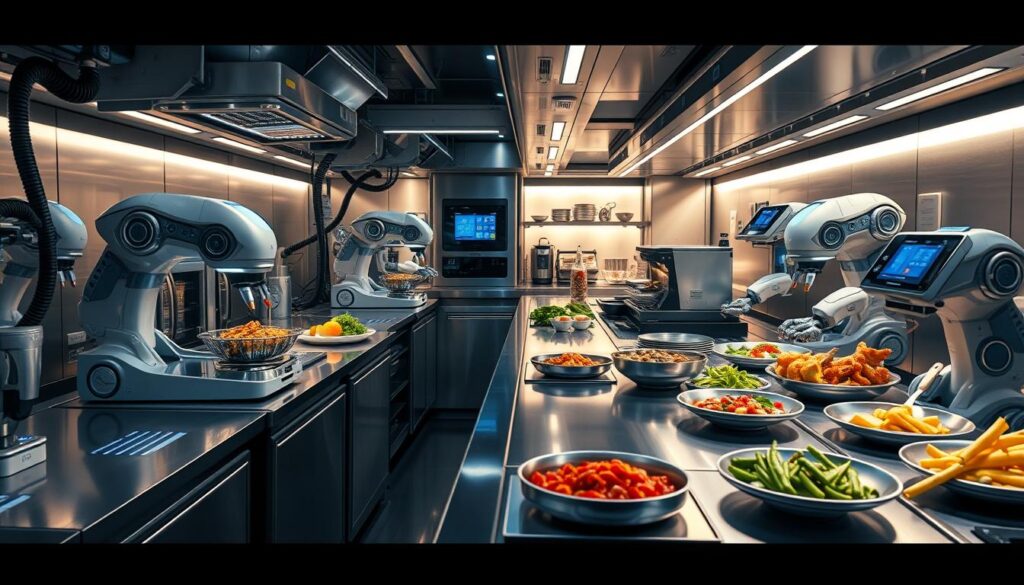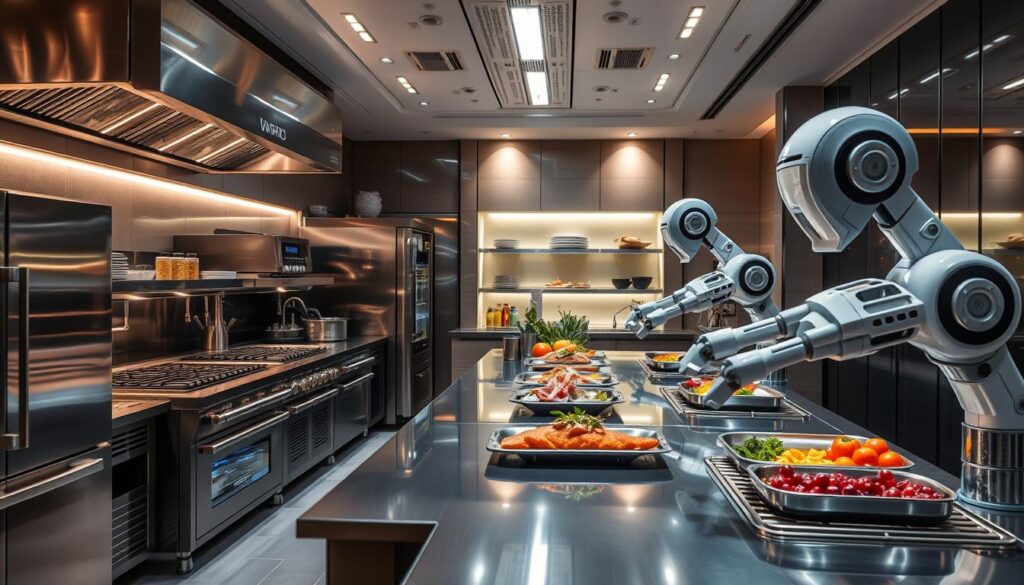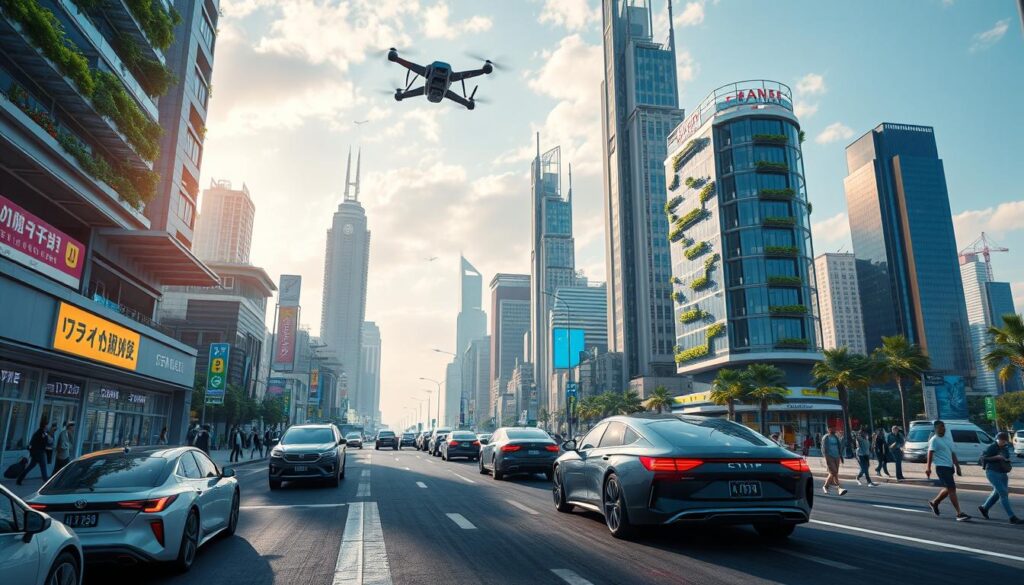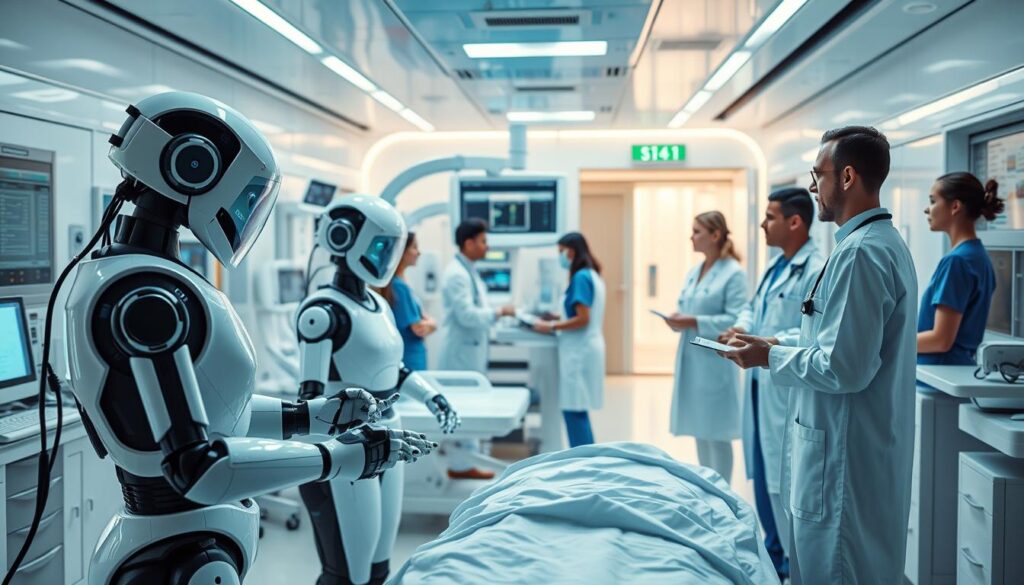The hospitality industry is changing fast. Hotels are now using automation to make their kitchens more efficient. This helps improve the quality of their food. In this article, we’ll look at how hotels can automate their food-making. This will lead to better efficiency, consistency, and cost savings.
Key Takeaways
- Discover innovative approaches to automate hotel food creation and boost efficiency
- Explore the benefits of implementing automation in hotel kitchens, from improved consistency and quality control to reduced labor costs
- Learn about the latest robotic cooking systems and AI-powered food production solutions transforming the hotel culinary landscape
- Understand how to integrate automation into existing hotel kitchens and address concerns around food safety and culinary team adaptation
- Gain insights into the future of hotel kitchen automation and the role of smart kitchen management and monitoring systems
The Culinary Landscape: An Evolving Industry
The hotel industry is changing fast. Chefs and operators must keep up with high-quality meals. They face challenges in traditional kitchens. Hotels are now using new technologies and automation to improve their food automation and implement automation in hotel food creation.
Embracing Innovation and Efficiency
Top hotels are using kitchen robotics and robotic cooking systems. These systems make food prep better and save on labor costs. They also make kitchens more efficient.
Challenges in Traditional Hotel Kitchens
Old hotel kitchens have problems like keeping quality high and dealing with staff shortages. New automated food prep helps solve these issues. It ensures every meal is top-notch.
| Challenges in Traditional Hotel Kitchens | Solutions Offered by Automation |
|---|---|
| Maintaining Consistent Meal Quality | Robotic cooking systems ensure precise temperature control, portion sizes, and cooking times, resulting in consistently delicious meals. |
| Labor Shortages and High Turnover | Automated food preparation solutions reduce the need for manual labor, allowing hotels to optimize their workforce and reallocate resources to other critical areas. |
| Adapting to Changing Guest Preferences | Intelligent meal assembly systems can quickly and efficiently adapt to new menu items, dietary requirements, and guest preferences, ensuring a seamless dining experience. |
By using food automation and implement automation in hotel food creation, hotels can meet the changing needs of guests. They become more efficient, consistent, and satisfying for guests.

The Rise of Hotel Kitchen Automation
The hotel industry is seeing a big jump in using automation in their kitchens. Robotic cooking systems and intelligent meal assembly solutions are changing how hotels make and serve food.
Food automation and kitchen robotics are leading this change. They make food prep better, save money, and make things run smoother.
| Key Benefits of Hotel Kitchen Automation | Impact |
|---|---|
| Consistent Meal Quality | Automated systems ensure every dish meets the same high standards, eliminating the risk of human error. |
| Reduced Labor Costs | Robotic cooking and assembly solutions reduce the need for manual labor, lowering staffing expenses. |
| Increased Efficiency | Automated processes streamline kitchen operations, allowing for faster meal preparation and delivery. |
As more hotels use hotel kitchen automation, they’ll see big improvements. Guests will get better service, and hotels will run better too.

“The integration of automation in hotel kitchens is a game-changer, revolutionizing the way we approach food preparation and service.”
– Executive Chef, Luxury Hotel Group
Benefits of implement automation in hotel food creation
Using automation in hotel food making brings many benefits. It changes the way food is made and makes guests happier. It makes food better and more consistent, saves money on labor, and makes things run smoother.
Consistency and Quality Control
Automated kitchens in hotels are very precise. They can measure ingredients and cook food just right. This means guests always get great food.
Reduced Labor Costs and Increased Efficiency
Using ai-powered food production in kitchens saves money and makes things more efficient. It does tasks like mixing and chopping for you. This lets people focus on serving guests better.
| Benefit | Impact |
|---|---|
| Consistency and Quality Control | Precise ingredient measurement, regulated cooking temperatures, and streamlined food safety protocols |
| Reduced Labor Costs | Automation of repetitive tasks, allowing reallocation of human resources to more specialized roles |
| Increased Efficiency | Optimized workflow, reduced preparation time, and enhanced output consistency |
By implementing automation in hotel food creation, hotels can offer better food and service. Guests will always get the best.
Automated Food Preparation Solutions
The hotel industry is changing fast, thanks to robotic cooking and intelligent meal assembly tech. These kitchen robotics are making kitchens more efficient. They help make food better and faster, improving the whole hotel food experience.
Robotic Cooking Systems
Robotic cooking systems are making kitchens more precise and efficient. They can do complex tasks like measuring and cooking with great accuracy. This lets chefs focus on creativity and quality, making food better and faster.
Intelligent Meal Assembly
Intelligent food manufacturing is changing how meals are made. It uses smart tech to make sure meals are just right, every time. This means better food, less work, and faster service for guests.
“Automated food preparation solutions are revolutionizing the hotel industry, empowering kitchens to achieve new levels of efficiency, consistency, and quality control.”
Hotels are now using these automated meal preparation tools. It shows they’re all about making things better for guests. They want to serve great food and do it well, thanks to new tech.
AI-Powered Food Production Systems
The world of cooking is changing fast, thanks to ai-powered food production systems. These new technologies are making hotel kitchens work better. They help make food faster, improve quality, and make things run smoother.
Smart kitchen systems and digital culinary solutions lead this change. They use AI, machine learning, and data to help chefs and kitchen staff. These tools let them make better choices, do less work, and keep food quality high.
AI can guess what guests will want and help manage food supplies. It looks at past data and current trends. This way, hotels can plan menus better, cut down on food waste, and save money.
| Feature | Benefit |
|---|---|
| Predictive Demand Forecasting | Optimize inventory and reduce food waste |
| Automated Meal Preparation | Ensure consistent quality and presentation |
| Real-Time Monitoring and Alerts | Enhance operational efficiency and food safety |
Hotel kitchens are getting better with these ai-powered food production systems. They’re set to become more efficient, save money, and make guests happier. All while making food taste even better.
“The integration of AI-powered technology is transforming the way hotel kitchens operate, enabling them to optimize their food creation processes and enhance the overall dining experience for guests.”
Smart Kitchen Management and Monitoring
The future of hotel kitchen automation is not just about food prep. It’s also about smart management and monitoring. These systems help hotels run smoothly, making it easier for managers to make good choices and keep improving.
Real-Time Inventory Tracking
Smart kitchen systems track inventory in real-time. This gives chefs and managers a clear picture of what they have. It helps hotels cut down on waste, order better, and have the right ingredients ready for guests.
Data-Driven Decision-Making
Smart kitchen automation systems create a lot of data. This data helps hotel operators make better choices. They can see how long meals take, what ingredients are used, and what guests like. This way, hotels can improve their digital culinary solutions and give guests a better dining experience.
By using hotel kitchen automation, hotels can reach new heights of success. Smart management and monitoring tools are changing the game. They make food creation and service better for everyone.
Integrating Automation into Existing Hotel Kitchens
The hotel industry is moving towards implement automation in hotel food creation. The challenge is to add these new technologies smoothly to current kitchens. It’s about finding the right balance between new tech and old systems.
Ensuring a smooth start is key. Hoteliers need to work with tech providers to plan carefully. They must consider the kitchen’s layout and workflow. This might include training and gradual changes to help staff adjust.
It’s also important to make sure new tech works well with what’s already there. Hotels should look for systems that fit easily with their current setup. This way, they can move to hotel kitchen automation without too much trouble.
| Challenges | Solutions |
|---|---|
| Integrating new technologies with existing infrastructure | Prioritize flexible, modular automation systems that can easily integrate with current kitchen equipment |
| Minimizing disruption to daily kitchen operations | Develop a strategic implementation plan with phased rollouts and comprehensive training programs |
| Ensuring smooth adoption by culinary teams | Implement effective change management strategies to help staff adapt to the new automated systems |
By tackling these issues, hotels can make the switch to automated kitchens. This leads to better efficiency, consistency, and profits.
Food Automation and Sustainability
The hotel industry is moving towards implement automation in hotel food creation. This change brings more than just better efficiency and quality. It also helps in making the industry more sustainable. With ai-powered food production and intelligent food manufacturing, hotels can cut down on food waste. This makes the industry more eco-friendly and socially responsible.
Reducing Food Waste
Automated food systems in hotel kitchens help reduce waste. They portion ingredients accurately and ensure meals are consistently good. These systems track inventory and adjust production to meet demand, preventing waste.
Optimizing Resource Utilization
- Automated systems use less energy and water, reducing a hotel’s environmental impact.
- They monitor and control kitchen equipment in real-time, using resources efficiently.
- They help hotel management make better choices about menus and inventory, boosting sustainability.
| Key Sustainability Metrics | Traditional Hotel Kitchens | Automated Hotel Kitchens |
|---|---|---|
| Food Waste Reduction | 20-25% | 10-15% |
| Energy Consumption | 30-35 kWh/m² | 25-30 kWh/m² |
| Water Usage | 500-600 liters/guest-night | 450-550 liters/guest-night |
By adopting implement automation in hotel food creation, hotels improve efficiency and quality. They also help make the industry and environment more sustainable.
Addressing Concerns and Challenges
The hotel industry is changing fast with automation in food creation. It’s key to tackle concerns and challenges. This includes making sure food is safe and clean, and training staff for new hotel kitchen automation and digital culinary solutions.
Ensuring Food Safety and Hygiene
Keeping food safe and clean is crucial in hotel kitchens. With implement automation in hotel food creation, it’s even more important. Hotels need strict rules, constant checks, and thorough staff training to protect guests and keep their reputation high.
Training and Adapting Culinary Teams
Introducing automation can worry kitchen staff. It’s vital to offer detailed training. This helps chefs and staff learn and use new tech smoothly. Hotels can then fully benefit from hotel kitchen automation and digital culinary solutions.
Hotels can overcome challenges by focusing on food safety, hygiene, and staff training. This way, they can make the most of implement automation in hotel food creation. By tackling these issues, hotels can improve efficiency, consistency, and guest happiness.
The Future of Hotel Kitchen Automation
The hotel industry is changing fast, and kitchen automation is at the forefront. New trends and tech advancements will change how hotels make food. This will help them offer amazing dining experiences to their guests.
Smart kitchen systems and intelligent food making will become common. Hotels will use advanced sensors, data, and AI to improve efficiency and food quality. Robots and automated systems will make cooking faster and cheaper, reducing mistakes.
Also, hotels will focus more on being green in the future. New tech will help them cut down on food waste and use resources better. Hotels will track their food and make choices based on data, pleasing guests who care about the environment.

